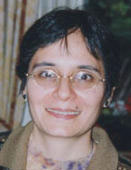Seema Kazi
India
“Gender, Nationalism and Militarization in (Indian administered) Kashmir” 2005

This research focuses on the militarization of a secessionist movement involving Kashmiri militants and security forces in the north Indian (administered) state of Jammu and Kashmir (hereafter referred to as Kashmir). Necessary field work for this research was completed by October 2004. The IPRA small research grant was used to address certain remaining gaps in field data which emerged during discussions with my supervisor. Accordingly, I spent a total of 5 weeks in Srinagar, Kashmir (25 June – 2 August) in order to interview members of the Indian security forces and women activists of the separatist groups who are also active in opposing the military occupation in Kashmir.
I interviewed two women from the Khwateen e Markaz – a local women’s group. Later, this organisation was kind enough to organise a group discussion for me with other members. They discussed with me the enormous difficulty in documenting abuse against women and moblising against military occupation. After considerable planning, I was also able to meet Asiya Andrabi – a woman leader of a separatist group who was underground and we therefore had to arrange to meet at a safe house through a mutual friend. It took considerable time and effort to meet with and interview the Indian military due to time-consuming bureaucratic and security procedures. I was not allowed to meet any ordinary soldier but only a Public Relations Officer (PRO) of the Indian army. I met with Colonel V.K.Gupta at the Indian Army’s huge cantonment at Badamibagh, Srinagar. While it was useful to meet him, it was very hard to elicit a response from him with reference to the record Indian military in Kashmir. As I understand it, the Indian Army which is an institution of the Indian state is, like the latter, unwilling to assume responsibility for its poor human rights record in Kashmir. Finally, I visited the library of the University of Kashmir, Srinagar where through the kindness of Prof. Bashir A Dabla, I was able to procure copies of local human rights reports which are not available elsewhere in India. I also took this opportunity to meet the students of Kashmir University with whom I informally discussed my research. The rest of my time was spent in Delhi where I visited the Sapru House library and the South Asian Documentation Centre for Human Rights in order to collect recent documentation on Kashmir.
All in all, I am satisfied with my research and have, since my return to London been working on transcribing the interviews and integrating the data into my thesis. I am due to submit two draft chapters on ‘Militarization in India’ and ‘Militarization in Kashmir’ respectively to my supervisor Prof.Kaldor next week and shall receive here feedback on 25 November, 2005. I have begun work on the draft chapter ‘Gender and Militarization’ but this is in the preliminary stage right now. I hope to complete this chapter by January 2006, which is, regrettably a month later than I had envisaged. This was because the draft on militarization in India – which is my main theoretical chapter – took almost three months. It shall be my endeavour to try to make up for lost time as best as I can.
I envisage completing my all my main draft chapters by January 2006, after which I shall begin work on the chapter on Methodology to be followed by completing the ‘Introduction’ and ‘Conclusion’. I aim to a complete a draft thesis by April 2006 which, after final comments by my supervisors, I hope to submit by June, 2006.
More information on Seema Kazi can be found on her Senesh Fellowship award page.
The Foundation acknowledges that Seema Kazi has successfully completed her project.
